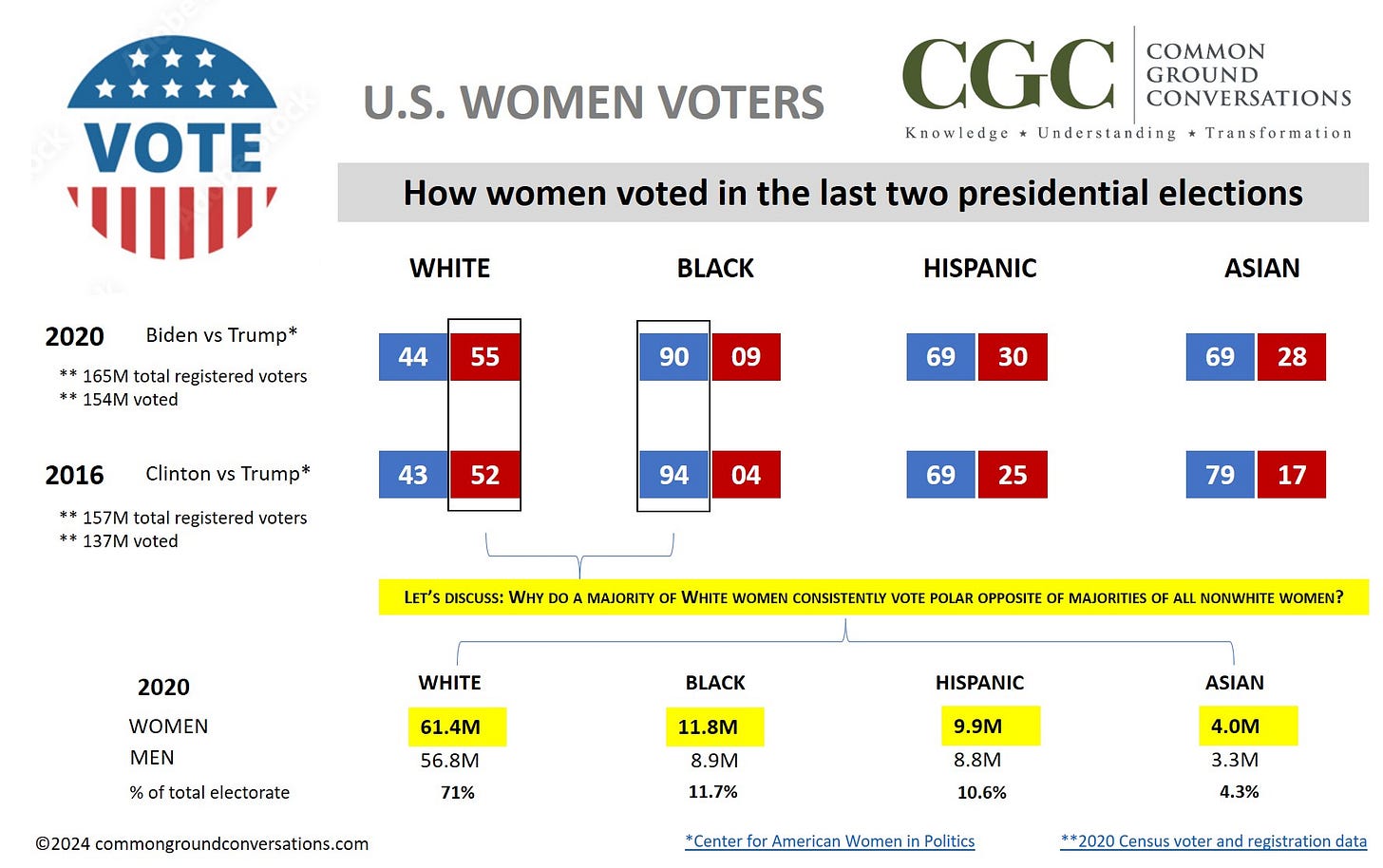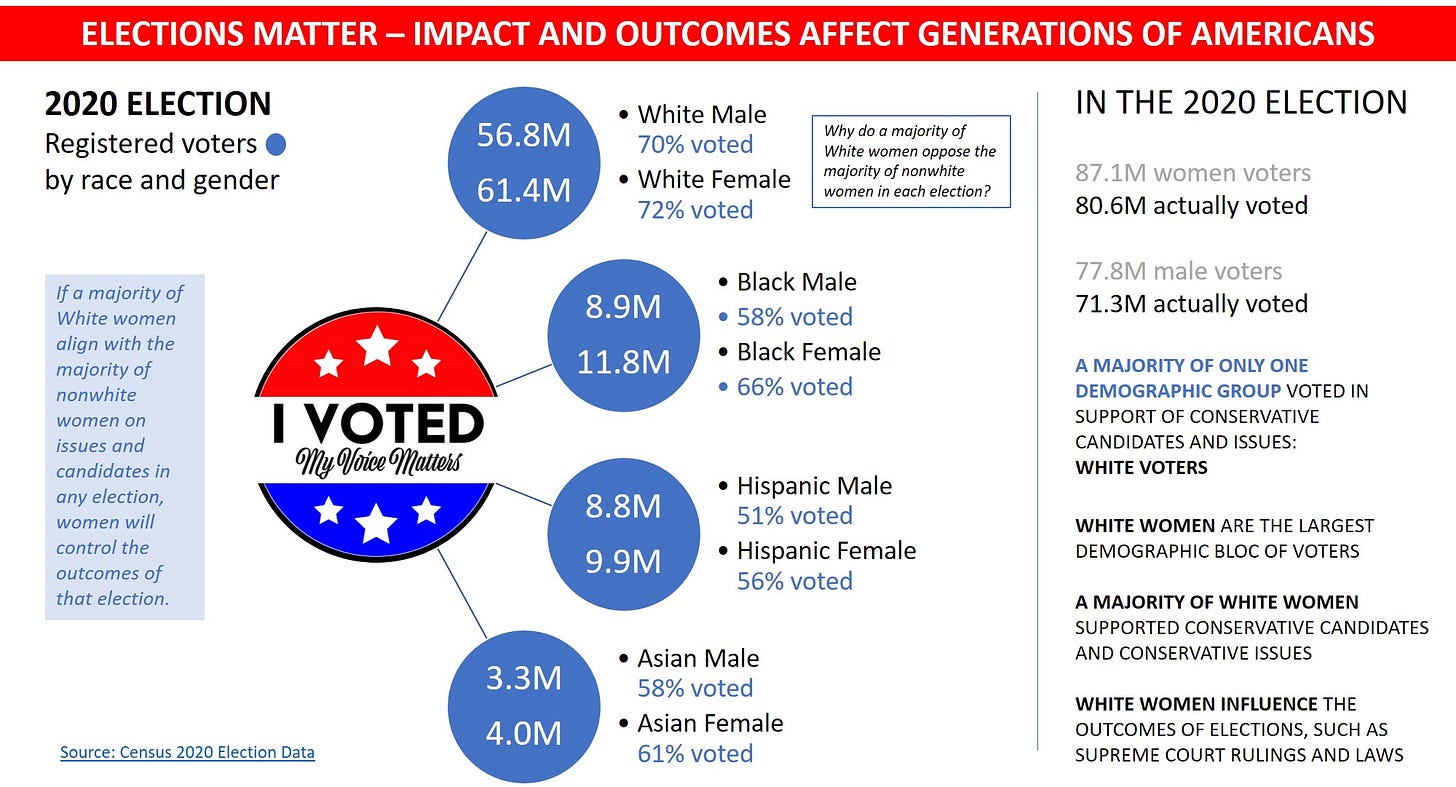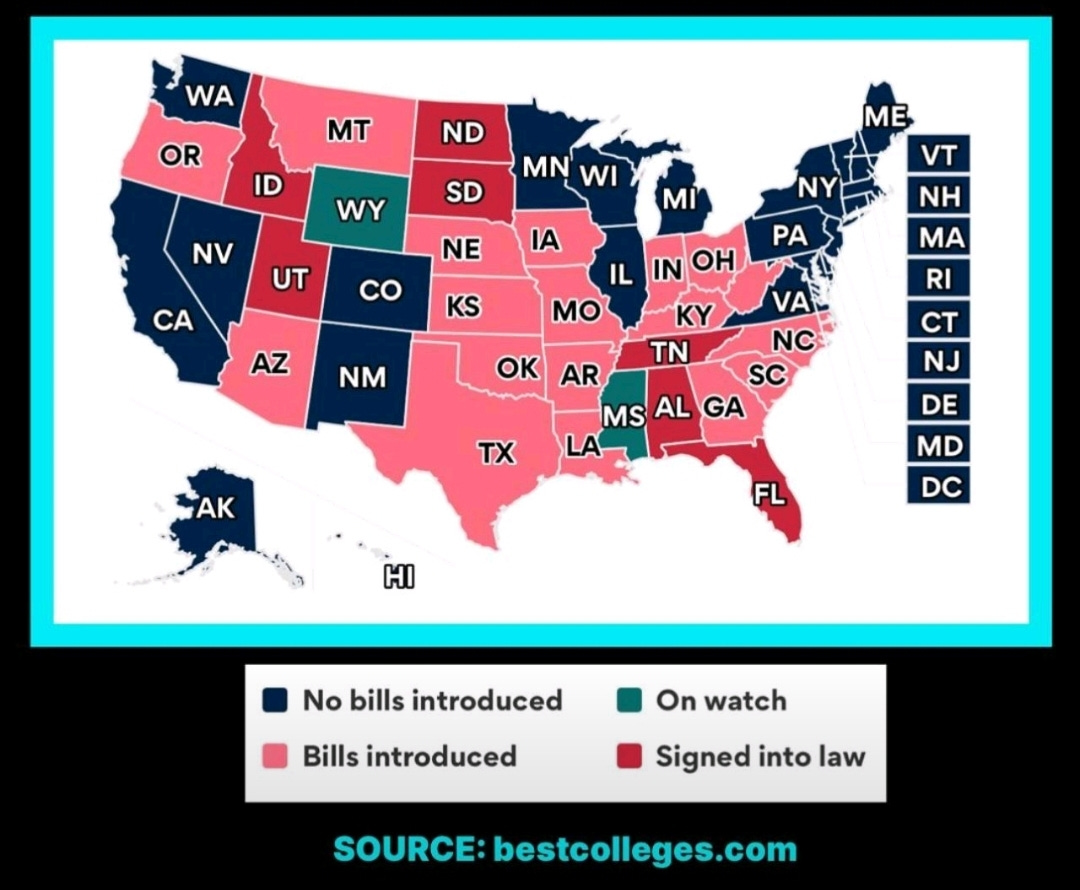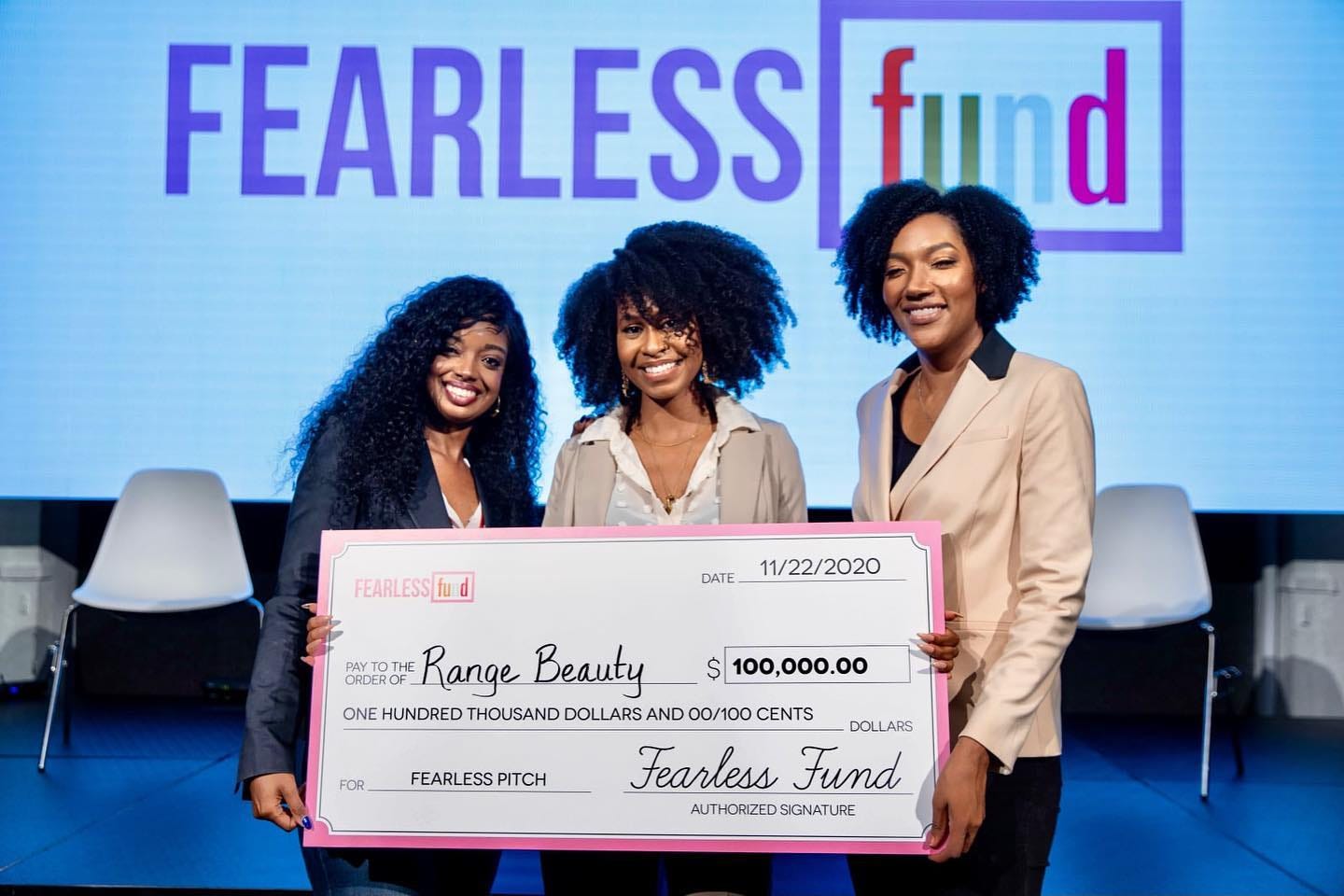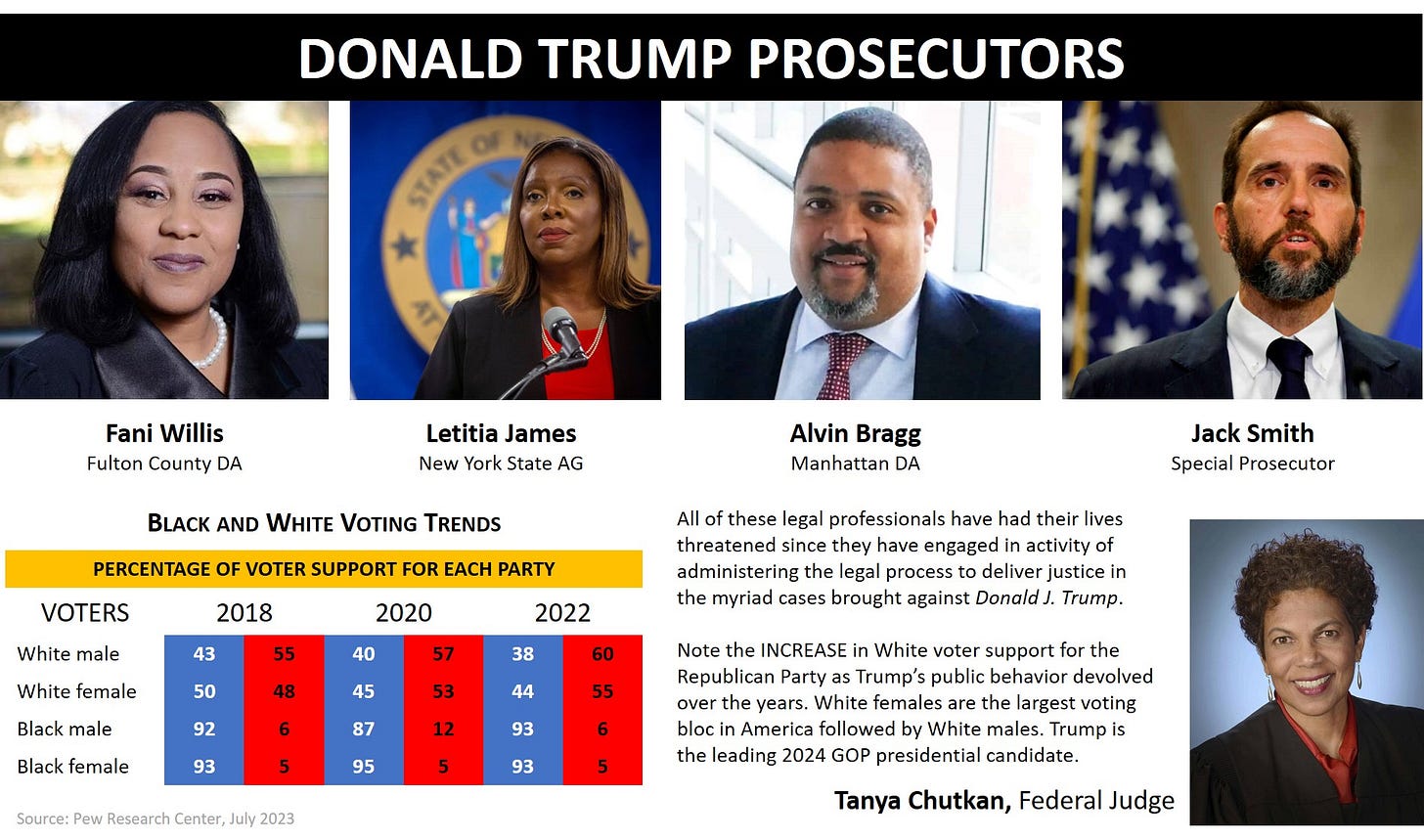CGC Journal - April 2024
We're Building a Co-learning Community of Empathetic Societal Change Agents
APRIL 2024 | ISSUE 9
THE WAR ON BLACK WOMEN AND DEI
TABLE OF CONTENTS:
Current Events - Race in the news
The War on Black Women and DEI
Emily’s Corner - Emily’s reflections and insights
Earnest Conversations
Talking With Kids -
Books can offer proximity for kids
Celebrating Change Agents -
Wales President Vaughan Gething
Conversation Starter -
Why do most White women vote polar opposite of most Black women?
Recommended Resources -
This month’s recommended resources
Community Corner -
We want to hear from you. We invite our community of co-learners to share with us what they are witnessing and experiencing in society where they live, work and play.
NOTE: For full access to the CGC Journal, please select one of the paid subscription options. Paid subscribers become part of our growing community of empathetic societal change agents who help support the mission of CGC and the continued expansion of our work. We appreciate you!
To learn more about CGC and our trademarked Conversations Journey® process for businesses, institutions and organizations of all kinds, please visit commongroundconversations.com.
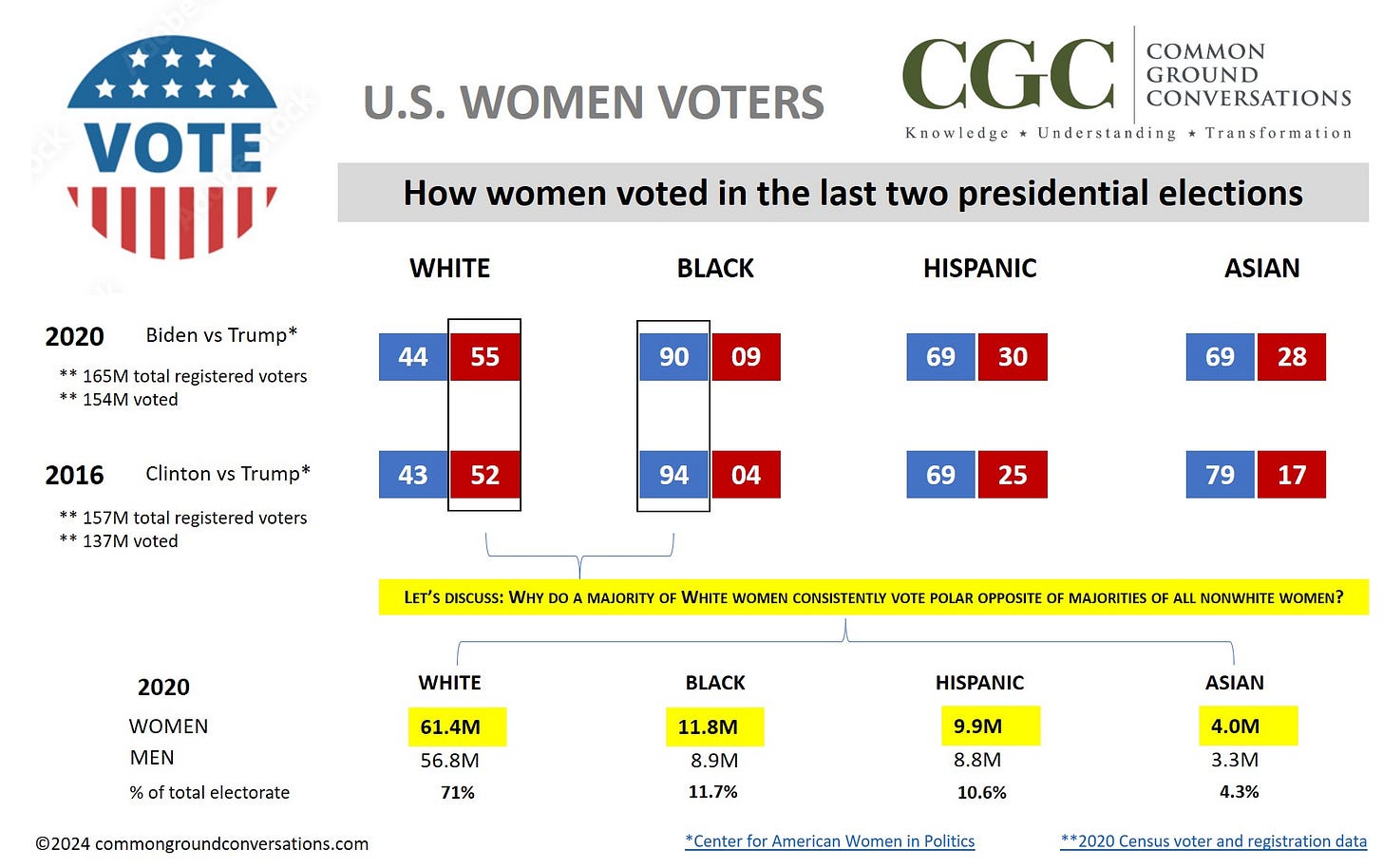
THE WAR ON BLACK WOMEN AND DEI
Consider this simple question:
Why do most of America’s White women voters (largest voting bloc in the nation) consistently vote polar opposite of the majority of America’s Black women voters in most every presidential election?
To be clear, over the past two presidential elections, a majority of White women voters have supported candidates that majorities of all nonwhite women voters opposed. This relatively unexplored question isn’t merely a theoretical exercise; the impact of voting patterns by a majority of White women has had significant ramifications on populations of color, particularly Black women.
To be fair, a minority of women across all racial groups increased their support for conservative candidates in the 2020 election. And while this increase across the board reflects some measure of influence by conservative candidates, it is a focus on a small minority. Meanwhile, the much larger majority across the landscape of women voters reflects a consistency that cannot be explained away by examining the small influence of messaging upon the minority in each group. The majority holds power. Black and White women have power to change conditions in society.
If only they align their majority votes.
SHARED CONCERNS
Black women routinely vote in political lockstep at 90% or more in concentrated alignment. They have shared concerns over addressing adverse societal conditions that impact their lives and the lives of their children, families, and communities. These concerns span eight generations, dating back to the end of the Civil War when Black women emerged from a system of enslavement and systemic rape. This trauma was replaced by systemic conditions of subjugation, terrorism, torture, rape, mass murder and daily fear of an unjust hostile society entrenched in the ideology of racial hierarchy (valuing and devaluing humans by the mythological construct of race) and white male supremacy.
Black women were among other populations of nonwhite women, particularly indigenous women, enduring generations of societal trauma ingrained in the conditions of a white society that didn’t value their existence, but merely tolerated it. Black women believed that societal conditions that produce systemic trauma must change for them to have the space and time needed to heal. Researchers have produced volumes of scientific insights into the devasting health effects of trauma, from both temporary and sustained conditions.
Bottom line: trauma is not what happens to you, but what happens inside of you as a result of what happened to you.
CONCERNS OF WOMEN
There’s no doubt that the majority of Black women experience society in uniquely different ways than the majority of White women, even though both groups share concerns over children, education, family and equitable access to resources and opportunities in society. The same is true of majorities all nonwhite women. Yet, in each election, media and political pundits routinely ignore the unique concerns of nonwhite women. The data offers us insight into a consistent pattern of voting.
A majority of women of color across all other nonwhite demographic groups are aligned with Black women in their voting patterns, which is one manifestation of their concerns about societal conditions. White women are the outliers, with a slim majority consistently opposed to the majorities of all nonwhite women voters, led by Black women.
The question we ask is simply, why?
ELECTION PATTERNS
In the 2020 election, there were 61 million White women registered voters compared to 12 million Black women, 10 million Hispanic women and 4 million Asian women. That means there are 35 million more registered White women voters than the entire population of nonwhite women voters.
Regardless of their rationale, when most White women support most White men in elections (second largest voting bloc), their votes sustain the status quo and ensure the pendulum of power swings away from women of color and their concerns. Conversely, White women also have the capacity to swing the pendulum of political power toward the concerns of women of color, which would produce systemic change.
WAR WAGED ON BLACK WOMEN AND DEI
Since Black women are the leading voices calling for systemic changes in America, and have concentrated their efforts in both political activism and private sector Diversity, Equity and Inclusion (DEI) efforts across industry sectors, it is important to understand the racialized dynamics of the onslaught of opposition that is targeting both Black women and DEI in America by a self-described “army of weaponized conservatives” operating under a vision, strategy and plan of action detailed in a 900-page document titled, Project 2025. (listen to a 25-minute interview; read document).
Today, a political war waged by White male conservatives on Black women and DEI has shed its veil of political correctness and plausible deniability to become more overt and direct. Project 2025 isn’t hidden. Neither are the leading voices of defending and protecting the status quo.
Leonard Leo of the Federalist Society has worked for many years to shape the landscape of the court system through appointment of judges including the Supreme Court. There are many others, as Project 2025 reveals. A network of more than 100 institutions and organizations are working daily to dismantle all of the incremental steps of progress made by Affirmative Action and DEI policies and practices supported by law.
CASUALTIES OF WAR
Following the Supreme Court’s decision in Students for Fair Admission v President and Fellows of Harvard College last year, there has been an onslaught of coordinated lawsuits and threats of lawsuits targeting numerous institutions, alongside threats made to corporate CEOs, small businesses, philanthropic organizations, K-12 schools and individuals who champion the cause of Diversity, Equity and Inclusion (DEI). The leading voices of DEI are Black women.
At least 28 states have introduced 82 anti-DEI bills, many of which have passed into law. Florida and Texas lead the anti-DEI parade with state laws that have compelled all schools receiving state funds to immediately comply with the new laws.
The University of Florida and the University of Texas have completely eliminated their DEI departments, firing dozens of employees this year. It should be noted that UT didn’t start admitting Black students until the 1950s, and today Black students are 4.5% of UT’s total student population of 53,000. That percentage is sure to drop. The people most concerned with access to opportunities for Black youth are Black women.
Black women aren’t just advocating, they are acting. Among Black students in higher education, Black women earn 64% of bachelors’ degrees, 71% of masters’ degrees and nearly 66% of doctoral, medical and dental degrees. This pipeline feeds into a broad variety of professional sectors. Black women are not just workers, but also represent the fastest growing population of entrepreneurs in America, and they own 36% of all Black employer firms. As DEI advocates, Black women are courageously leading the effort to change conditions in the workplace environment in corporate America, higher education and government agencies, landscapes of power dominated by White males.
The war waged against Black women and DEI is led primarily by White male conservatives.
White male conservatives attacked the Fearless Fund, an effort launched by two prominent Black women to help fund startup companies led by women of color. They attacked the George Floyd scholarship program at North Central University in Minnesota. They successfully disbanded the entire board of directors at Tennessee State University, a 112-year-old institutional member of a landscape of Historically Black Colleges and Universities (HBCUs were built over a period of 100 years following the Civil War because America’s higher education institutions prohibited mass inclusion of Black students). In Congress, they successfully disbanded the House of Representatives DEI office. And this is just a very brief list of battlegrounds where war has been waged against the progress of people of color and their children across the nation.
In many sectors of society (not all) where Black women are leading DEI efforts, they are under attack. One of the most high-profile attacks was on Harvard University President, Claudine Gay, which led to her resignation and the shortest tenure as president in the university’s history.
The latest victim in a seat of significant prominence was Dr. Sherita Golden at Johns Hopkins Medicine. She was forced to resign following a barrage of written complaints to the institution. Her crime: Dr. Golden enraged a hidden sector of well-heeled powerful people in the Johns Hopkins sphere of influence when she defined privilege as “a set of unearned benefits given to people who are in specific social groups.” Dr. Golden said, “privilege operates on personal, interpersonal, cultural and institutional levels, and it provides advantages and favors to members of dominant groups at the expense of members of other groups.”
The mistake Dr. Golden made was in listing the groups of people for whom her description of “privilege” was applied. That list included “White Christian males.”
The backlash was swift.
BLACK WOMEN UNDER ATTACK
Operating in plain sight, yet under the radar of mainstream media and punditry, there are Black women in power are under consistent attacks by Donald J. Trump and his supporters. These Black women represent the wheels of American justice, which have previously rusted over when Trump was involved, which is an astonishing number of cases: more than 4,000.
While the civil and criminal cases brought against Trump in New York and Georgia are led by Black women (New York Attorney General Letitia James and Fulton County District Attorney Fani Willis), one of the judges overseeing the trial is also a Black woman, Federal Judge, Judge Tanya Chutkan. Each of these Black women have had their lives threatened repeatedly and require strong security measures to protect them to this day.
In the presidential election of 2024, Black women are doubling down on their efforts to change the conditions in society to build a more equitable and Inclusive America for a 21st century multiracial, multicultural population. But they face a heavy onslaught of well-heeled, well-organized Christian conservatives who have waged war in defense of the status quo. These hostile opponents of DEI have proclaimed that it is they who are under attack. These discussions and debates are happening all over the nation in institutions of higher learning, including Harvard University.
This debate over the war waged against DEI being used as a tool of societal change even occurred in Congress earlier this year, to which a group of academic scholars responded with a seminal report to set the record straight. It was published by the University of Southern California’s Race and Equity Center in March 2024. (Read full report here).
The balance of power in the war waged on Black women and DEI may be determined this year upon the fulcrum of how the majority of White women will vote. And that raises the critical question which is missing from our national discourse:
Why do most White women vote opposite of most Black women?
Let’s explore the answer to understand.
Please consider joining our growing community of co-learners and help support the work of Common Ground Conversations.





